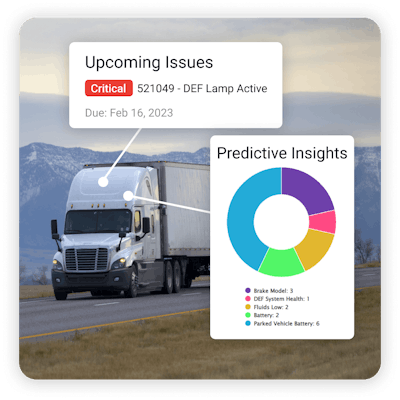
The logistics industry faces a number of challenges impacting the bottom line. These include managing and meeting growing customer demands, addressing a shortage of qualified technicians and controlling increased operation costs. To tackle each, it can be a time consuming effort for the team. That is why fleets are looking toward automated solutions and artificial intelligence (AI) where the technology grows as the business does. But to see AI’s true impact in fleet operations, the most valuable place to start is in maintenance.
According to recent studies by the American Transportation Research Institute and the Journal of Business Logistics, the rising costs of trucks, parts and maintenance (10% from previous years), as well as the shortage of qualified technicians, are impacting a carrier’s bottom line. In response, PwC's report on transportation and logistics trends highlights the need for faster, more reliable, and more flexible services in order to stay afloat and ahead of the competition.
AI technology, once a buzzword, is now making significant strides in improving productivity and efficiency. Thanks to ChatGPT4 and other forms of AI, those who were once skeptics of AI are able to see its true power. Moving their ideas of AI away from concept and into implementation of everyday life, it has become less of a mystery and more tangible, with universal applications. In fleet maintenance, by leveraging the data collected already there from fleet management systems, ELD/telematics and diagnostic tools, predictive AI can accurately forecast potential breakdowns and reduce downtime, streamlining operations without the need for additional hands while decreasing significant expenses.
With the power of AI, algorithms can accurately predict which assets are likely to break down, enabling fleet managers to take proactive maintenance measures that help avoid costly repairs, drivers stuck on the side of the road and the ability to order parts ahead of time to improve utilization of their fleet as well as extend asset lifespan. The amazing thing about this technology is that it will just continue to get smarter over time, building off of each data point and learning from each alert.
For example, a beverage distribution company with a fleet of 120 heavy-duty trucks was manually updating its spreadsheets, leading to an overwhelming amount of data underutilized, human error and gaps in their view of maintenance scheduling and prioritizing. To effectively streamline their maintenance flow, the distribution company needed a new workflow. Enter predictive AI technology.
With a simple AI software tool, the company was able to transform its maintenance operations with no extensive time training or educating on a new process. From a heavy paper trail that was a time-consuming task to an automated workflow utilizing the real-time vehicle data already there, the distribution fleet could now accurately access an overview of their vehicle metrics, while easily communicating potential alerts between drivers and maintenance shops. This led to preventing multiple on-the-road breakdowns costing over $5,000 each year, an expense in today’s logistics industry that was influential to their success.
There are many who wonder if AI will take over their jobs. It's important to note that AI is not meant to replace human decision-making, but to augment it. While AI can perform routine tasks such as maintenance planning and vehicle management, it still requires human input and oversight to ensure good judgment. In simple terms, it allows you to do your best work.
By harnessing the power of AI, logistics companies can gain a competitive edge by optimizing fleet performance, reducing costs, and improving overall efficiency. The crux of thriving in this tough market is no longer about the computers in your trucks and shops, but rather the intelligence you extract from the data being collected. With the help of AI, logistics companies can free up their team’s time spent on finding ways to overcome the industry challenges and instead turn to focus on critical decision-making, keeping the business running and meeting customer demands, all the while staying ahead of competition.


















